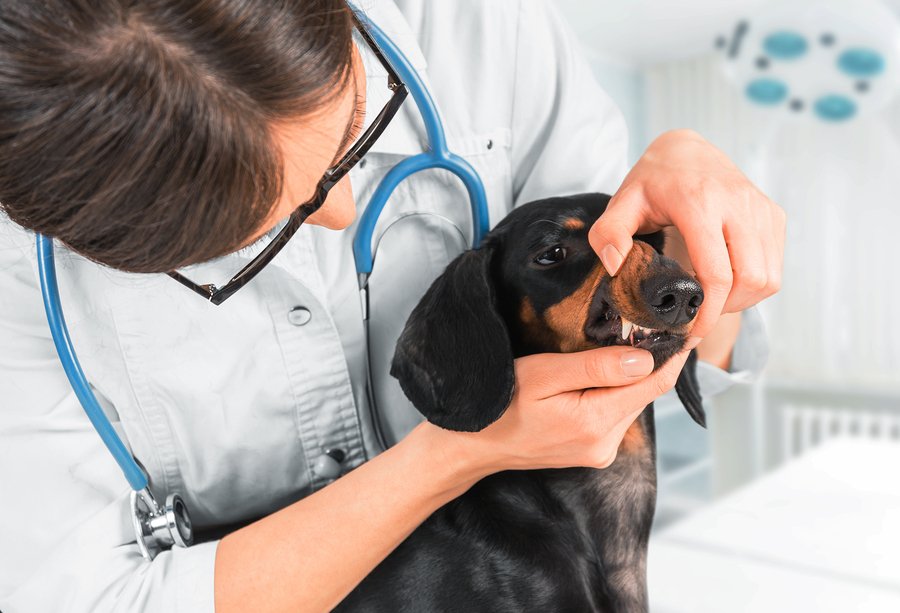Dental Care for Your Four Legged Friend

The American Dental Association recommends that we brush our teeth twice a day, floss daily, and visit our dentist regularly to have teeth cleanings and oral exams. Keeping our teeth clean is vital to our oral health and well being, why should our pets be any different.
When was the last time you brushed your pet’s teeth or had them professionally cleaned? For many people the answer could be never. This seemingly slight overlook of your pet’s dental care could be causing serious problems in your pooch’s mouth.
According to the Veterinary Oral Health Council website, periodontal disease (gum disease) is the most common disease occurring in pets and dogs. Gum disease is an infection resulting from the build-up of soft dental plaque on the surfaces of the teeth around the gums. The bacteria in dental plaque irritate the gum tissue if allowed to accumulate, which can often lead to infection in the bone surrounding the teeth.
After plaque has formed, hard dental tartar, which consists of calcium salts from saliva that has been deposited on plaque, begins to grow. If the surface of the tooth does not stay clean, tartar begins to form within a few days. The un-brushed tooth provides a surface that boosts further plaque accumulation. If allowed to accumulate, tartar is difficult to remove without dental instruments.
For our pets, gum disease means bad breath, painful irritated gums that can lead to bleeding and loss of appetite, and the loss of teeth if the roots have been affected. There is also the possibility that the bacteria surrounding the root of the tooth gains access to the bloodstream, which can lead to microscopic damage of the heart, liver, and kidney. As the severity of the gum disease increases, so does the damage.
The best way to ward off periodontal disease in your pet is prevention. Keeping your pets teeth clean can help prevent oral health problems.
“Ideally, you should brush your pet’s teeth daily,” states Dr. Johnathon Dodd, a clinical associate professor at the Texas A&M College of Veterinary Medicine & Biomedical Sciences. “Make sure you are using special toothpaste that is made for pets and is safe for them to swallow. They cannot spit or rinse like we do, therefore, our pets need specific kinds of toothpaste that is not harmful if ingested.”
Your veterinarian and local pet retail stores should carry toothbrushes and toothpaste for your pets. Different flavors of toothpastes are available for dog and cats.
In addition to brushing your pet’s teeth daily, it is also important for pets to have their teeth cleaned and examined by a professional.
“Your pet needs to get their teeth cleaned yearly,” notes Dodd. “Most veterinary clinics should offer dental cleaning services, but if they do not they can refer you to someone who does.”
To help ward off gum diseases and keep bad breath at bay, there are products you can feed your pet that help improve and promote oral health.
“There are certain dog treats that help promote good dental health,” explains Dodd. “The right kind of treat should crumble, be easily crushed, and contain chlorhexadine or a hydrogen peroxide-type additive that can help with the bacteria count in the animal’s mouth. Balancing this bacteria count can help prevent and get rid of bad breath.”
A helpful guide to go by when considering your pets’ oral health is the Veterinary Oral Health Council website. They have compiled a list of products that are intended to help reduce the buildup of plaque and tartar on the teeth of animals and created the VOHC seal of approval. Pet products approved by the Veterinary Oral Health Council can be recognized by the VOHC seal on the packaging. To see the full list of VOHC approved products visit www.vohc.org.
Brushing your pet’s teeth, taking them for a yearly visit to the dentist, and giving them VOHC approved products are all ways that you can help make sure your pet has a clean and healthy mouth.
Pet Talk is a service of the College of Veterinary Medicine & Biomedical Sciences, Texas A&M University. Stories can be viewed on the Web at vetmed.tamu.edu/news/pet-talk. Suggestions for future topics may be directed to editor@cvm.tamu.edu.
Angela G. Clendenin
Director, Communications & Public Relations
Ofc – (979) 862-2675
Cell – (979) 739-5718


